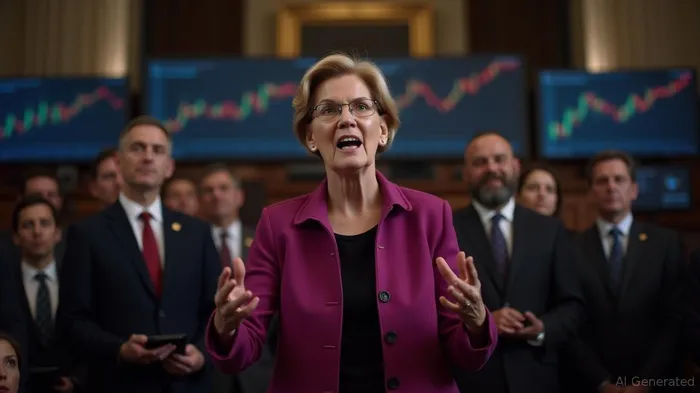Senator Warren Calls for Crypto Regulation to Prevent SEC Avoidance
Senator Elizabeth Warren, on July 9, 2025, called for enhanced regulatory oversight in the cryptocurrency market during a Senate Banking Committee hearing. Warren's proposal underscores concerns about financial stability and aims to establish regulations comparable to those in traditional financial systems. The hearing emphasized Warren's push for a regulatory framework that addresses money laundering and financial stability. Industry leaders, including RippleXRP-- CEO Brad Garlinghouse, highlighted the need for rules that support innovation. Warren's framework focuses on closing loopholes and applying securities laws to crypto assets.
Potential impacts of Warren's proposal include increased scrutiny of major crypto assets like BTC, ETH, and stablecoins. Past calls for regulation have led to market volatility and liquidity outflows. Warren's emphasis on investor protection could reshape the market landscape, affecting both traditional and digital finance. Warren's framework might challenge existing market structures by demanding equal regulatory measures for crypto and traditional assets. This shift could transform the financial and technology sectors, potentially stalling innovation if not balanced. The discussion reflects ongoing debates about aligning crypto regulations with established financial practices.
Warren has expressed significant concerns regarding the proposed Digital Asset Market Structure Act, commonly referred to as the CLARITY Act. This legislation aims to establish a clear regulatory framework for digital assets within the United States. However, Warren has warned that the current draft of the bill could inadvertently create a loophole, allowing non-cryptocurrency companies to bypass crucial Securities and Exchange Commission (SEC) regulations by tokenizing their existing stock. During a recent hearing in Washington D.C., Warren highlighted the potential for major publicly listed companies, such as MetaMETA-- and TeslaTSLA--, to tokenize their shares. This move could enable these companies to escape the stringent SEC reporting, disclosure, and investor protection rules. Warren argues that such a scenario poses a substantial threat to the established financial system and the trust placed in public markets. She fears that companies choosing to remain traditionally listed would face higher compliance burdens than those that opt for tokenization, creating an uneven playing field.
The core of Warren’s warning revolves around the concept of tokenized assets. Tokenization involves converting rights to an asset into a digital token on a blockchain, which can apply to various assets, including real estate, art, and corporate stocks. Warren’s concern is that if a company tokenizes its shares and the CLARITY Act categorizes these tokens differently from traditional securities, the company might argue that it no longer needs to comply with full SEC regulations. This could result in less frequent or less detailed public disclosures, different accounting standards, and reduced investor protections.
While Senator Warren’s concerns are valid, the cryptocurrency industry has long advocated for clear and sensible regulation. Brad Garlinghouse, CEO of Ripple, offered a contrasting perspective during the same hearing. He emphasized the significant participation of individuals in the crypto economy, stating that over 55 million Americans are now involved. Garlinghouse’s argument is not for a lack of regulation but for a framework that is both comprehensive and conducive to innovation. He asserted that a sensible regulatory structure for the cryptocurrency market is essential and long overdue. The industry’s call for clarity stems from the desire to operate within defined legal boundaries, which would foster greater institutional adoption, investor confidence, and legitimate growth, rather than forcing businesses into a grey area or overseas.
The debate surrounding the CLARITY Act and Senator Warren’s warnings underscores the profound challenges in regulating a rapidly evolving technological landscape. On one hand, there is a clear need to protect investors and maintain market integrity, which is the cornerstone of the SEC’s mission. On the other hand, stifling innovation through overly broad or ill-fitting regulations could prevent the U.S. from leading in the digital economy. The core tension lies in finding a regulatory approach that protects investors, fosters innovation, ensures market integrity, and provides clarity to businesses and consumers. The discussion around SEC avoidance and tokenized assets is not just about crypto; it’s about the future of financial markets themselves. It highlights the intricate dance between technological advancement and regulatory oversight, demanding careful consideration from policymakers to ensure that any new legislation serves both innovation and public interest. The outcome of this legislative discourse will undoubtedly shape the future trajectory of both traditional finance and the burgeoning digital asset space.

Quickly understand the history and background of various well-known coins
Latest Articles
Stay ahead of the market.
Get curated U.S. market news, insights and key dates delivered to your inbox.



Comments
No comments yet